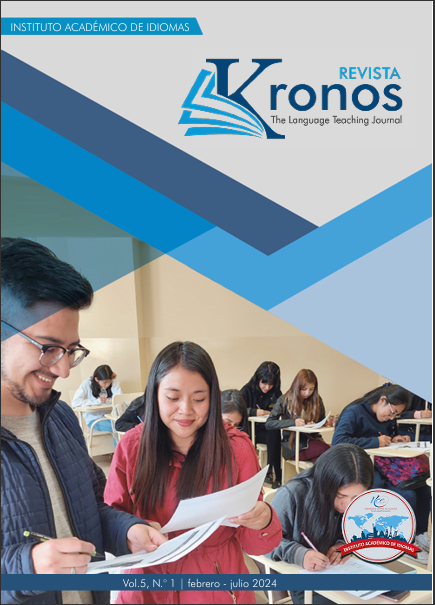Descubriendo el aprendizaje socio emocional para una mejor práctica docente
DOI:
https://doi.org/10.29166/kronos.v5i1.5417Palabras clave:
CASEL, estudiante, docentes, competencias, SELResumen
Actualmente, el aprendizaje socioemocional (SEL) y sus beneficios no han sido suficientemente socializados entre los docentes, familias y comunidades. El sistema educativo principalmente se ha centrado en algunos enfoques que ayudan al desarrollo cognitivo únicamente, mientras que estudios alrededor del mundo indican que el modelo formativo SEL promueve el crecimiento académico, social y emocional de los estudiantes. Por esta razón, este estudio bibliográfico pretende resaltar la importancia del SEL y las ventajas de integrarlo en el aprendizaje del idioma como parte de un eje interdisciplinario a través de su aplicación en la vida cotidiana. El enfoque es cualitativo con un aporte cuantitativo de investigación descriptiva que empleó una encuesta en línea como instrumento para recolectar datos de cuarenta y siete profesores de inglés del Instituto Académico de Idiomas (IAI) de la Universidad Central del Ecuador. Los resultados se analizaron mediante el software SPSS. Estos revelaron que la mayoría de los docentes tenían conocimientos sobre SEL; sin embargo, querían profundizar sus conocimientos sobre el mismo y la manera de aplicarlo en sus clases. Además, se observó que, de hecho, los profesores utilizaban pocas tareas colaborativas, pero no las identificaban como actividades SEL. Además, no estaban seguros de si el instituto promueve proyectos sociales que impliquen la participación de los alumnos, ni tampoco si SEL forma parte del plan de estudios. Es evidente que existe la necesidad de desarrollar diferen tes habilidades socioemocionales en los estudiantes. En consecuencia, es crucial capacitar a los profesores en SEL, esto puede repercutir positivamente en la adquisición de habilidades del idioma. Finalmente, se necesitan más investigaciones y proyectos para identificar si las actividades SEL promueven o no el aprendizaje de idiomas en la educación ecuatoriana
Descargas
Citas
Astra, Banzragch, Ketevan, Reem, A.-, & Solimar, S. (2023). ACTIVITIES & TOOLS FOR DEVELOPING RESPONSIBLE DECISION-MAKING SKILL ON SOCIO-EMOTIONAL LEARNING IN THE ENGLISH CLASS (A final project submitted to World Learning in partial fulfillment of the requirements for the Social Emotional Learning (SEL) in the English Language Classroom Exchange, sponsored by the Department of State., p. 26). Department of State.
CASEL’S SEL Framework. (2020). CASEL. https://casel.s3.us-east-2.amazonaws.com/CASEL-SEL-Framework-11.2020.pdf
CNN (Director). (2022, enero 18). Study: Covid-19 closures can harm kids’ mental health. https://www.youtube.com/watch?v=3eimL-RYI2o
Comercio, G. E. (n. d.). El respaldo de la familia puede ser decisivo para evitar los suicidios. El Comercio. https://www.elcomercio.com/tendencias/respaldo-familia-decisivo-evitar-suicidios.html
Conley, C. S. (2015). SEL in Higher Education. Handbook of Social and Emotional Learning: Research and Practice.
Day, D. V., Zaccaro, S. J., & Halpin, S. M. (2004). Leader Development for Transforming Organizations: Growing Leaders for Tomorrow. Psychology Press. DOI: https://doi.org/10.4324/9781410610102
López, G. A. A., Casco, T. Y. B., Hernández, M. A., & Falconí, L. V. O. (2022). La educación emocional como parte del currículo educativo ecuatoriano. M. A., 6. DOI: https://doi.org/10.26820/recimundo/6.(suppl1).junio.2022.298-307
Mahoney, J. L., Durlak, J. A., & Weissberg, R. P. (2018). An update on social and emotional learning outcome research. 100(4), 18-23. DOI: https://doi.org/10.1177/0031721718815668
Martinsone, B. (2016). Social emotional learning: Implementation of sustainability-oriented program in Latvia. 18(1), 57-68. DOI: https://doi.org/10.1515/jtes-2016-0005
Melnick, H., Cook-Harvey, C., & Darling-Hammond, L. (2017). Encouraging Social and Emotional Learning In the Context of New Accountability. Learning Policy Institute.
Casel.org (n. d.). Our History. Retrieved August 31, 2023, from https://casel.org/about-us/our-history/
The Social Emotional Teacher (n. d.). Relationship Skills in the Classroom. Retrieved August 29, 2023, from https://www.thesocialemotionalteacher.com/relationship-skills-in-the-classroom/
Greater Good In Education (n. d.). SEL for Students: Social Awareness and Relationship Skills.. Retrieved August 29, 2023, from https://ggie.berkeley.edu/student-well-being/sel-for-students-social-awareness-and-relationship-skills/
Transforming Education (Director). (2017, junio 6). Importance of Self-Efficacy. https://www.youtube.com/watch?v=VW5v6PQ5PEc
Ulavere, P., & Veisson, M. (2015). Values and values education in Estonian preschool child care institutions. 17(2), 108-124. DOI: https://doi.org/10.1515/jtes-2015-0014
Wang, N., Wilhite, S. C., Widener University, Wyatt, J., Widener University, Young, T., Widener University, Bloemker, G., Widener University, Wilhite, E., & Penn State University. (2012). Impact of a College Freshman Social and Emotional Learning Curriculum on Student Learning Outcomes: An Exploratory Study. Journal of University Teaching and Learning Practice, 9(2), 120-140. https://doi.org/10.53761/1.9.2.8 DOI: https://doi.org/10.53761/1.9.2.8
What Is the CASEL Framework? (2023). CASEL. https://casel.org/fundamentals-of-sel/what-is-the-casel-framework/
Yoder, N., Atwell, M. N., Godek, D., Dusenbury, L., Bridgeland, J. M., & Weissberg, R. (2020). PREPARING YOUTH FOR THE WORKFORCE OF TOMORROW: Collaborative for Academic, Social, and Emotional Learning (CASEL).
Publicado
Cómo citar
Número
Sección
Licencia
Derechos de autor 2024 María del Carmen Rondal Guanotasig, Nelly Daniela Espinoza Molina, Diana Natalia Alvarez Pulupa

Esta obra está bajo una licencia internacional Creative Commons Atribución-NoComercial-CompartirIgual 4.0.












